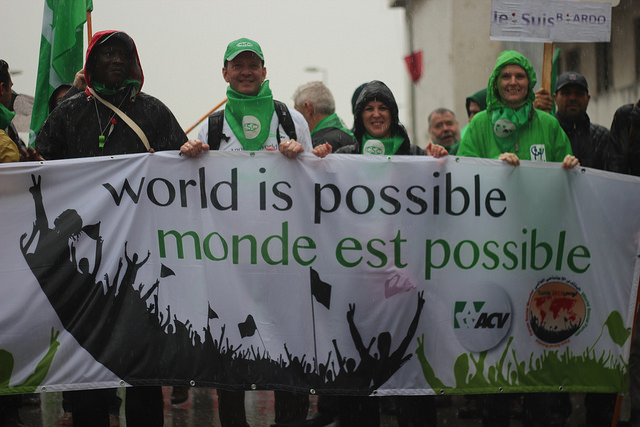The annual World Economic Forum in Davos brought together representatives from government and business to deliberate how to solve the worsening climate and ecological crisis. The meeting came just as devastating bush fires were abating in Australia. These fires are thought to have killed up to one billion animals and generated a new wave of climate refugees. Yet, as with the COP25 climate talks in Madrid, a sense of urgency, ambition and consensus on what to do next were largely absent in Davos. But an important debate did surface – that is, the question of who, or what, is to blame for the crisis. Famed primatologist Dr Jane Goodall remarked at the event that human population growth is responsible, and that most environmental problems wouldn’t exist if our numbers were at the levels they were 500 years ago. This might seem fairly innocuous, but its an argument that has grim implications and is based on a misreading of the underlying causes of the current crises. As these escalate, people must be prepared to challenge and reject the overpopulation argument.
 The high-carbon consumption habits of the world’s richest people are more to blame for the climate crisis than population growth in poor regions.
Artem Ermilov/Shutterstock
In 2018 the planet’s top emitters – North America and China – accounted for nearly half of global CO₂ emissions. In fact, the comparatively high rates of consumption in these regions generate so much more CO₂ than their counterparts in low-income countries that an additional three to four billion people in the latter would hardly make a dent on global emissions.
There’s also the disproportionate impact of corporations to consider. It is suggested that just 20 fossil fuel companies have contributed to one-third of all modern CO₂ emissions, despite industry executives knowing about the science of climate change as early as 1977.
Read more:
Climate action must now focus on the global rich and their corporations
Inequalities in power, wealth and access to resources – not mere numbers – are key drivers of environmental degradation. The consumption of the world’s wealthiest 10% produces up to 50% of the planet’s consumption-based CO₂ emissions, while the poorest half of humanity contributes only 10%. With a mere 26 billionaires now in possession of more wealth than half the world, this trend is likely to continue.
Issues of ecological and social justice cannot be separated from one another. Blaming human population growth – often in poorer regions – risks fuelling a racist backlash and displaces blame from the powerful industries that continue to pollute the atmosphere. Developing regions in Africa, Asia and Latin America often bear the brunt of climate and ecological catastrophes, despite having contributed the least to them.
The problem is extreme inequality, the excessive consumption of the world’s ultra-rich, and a system that prioritises profits over social and ecological well-being. This is where where we should be devoting our attention.
This article is republished from The Conversation under a Creative Commons license. Read the original article.
The high-carbon consumption habits of the world’s richest people are more to blame for the climate crisis than population growth in poor regions.
Artem Ermilov/Shutterstock
In 2018 the planet’s top emitters – North America and China – accounted for nearly half of global CO₂ emissions. In fact, the comparatively high rates of consumption in these regions generate so much more CO₂ than their counterparts in low-income countries that an additional three to four billion people in the latter would hardly make a dent on global emissions.
There’s also the disproportionate impact of corporations to consider. It is suggested that just 20 fossil fuel companies have contributed to one-third of all modern CO₂ emissions, despite industry executives knowing about the science of climate change as early as 1977.
Read more:
Climate action must now focus on the global rich and their corporations
Inequalities in power, wealth and access to resources – not mere numbers – are key drivers of environmental degradation. The consumption of the world’s wealthiest 10% produces up to 50% of the planet’s consumption-based CO₂ emissions, while the poorest half of humanity contributes only 10%. With a mere 26 billionaires now in possession of more wealth than half the world, this trend is likely to continue.
Issues of ecological and social justice cannot be separated from one another. Blaming human population growth – often in poorer regions – risks fuelling a racist backlash and displaces blame from the powerful industries that continue to pollute the atmosphere. Developing regions in Africa, Asia and Latin America often bear the brunt of climate and ecological catastrophes, despite having contributed the least to them.
The problem is extreme inequality, the excessive consumption of the world’s ultra-rich, and a system that prioritises profits over social and ecological well-being. This is where where we should be devoting our attention.
This article is republished from The Conversation under a Creative Commons license. Read the original article.

Degrowth is usually translated into German as "Postwachstum" (post growth) or "Wachstumsrücknahme" (reversing growth), but it can also be translated as “ausgewachsen” (grown up). This captures two aspects: on the one hand the end of growth and on the other hand the entry into a stage of maturity, namely adulthood. Adults are expected to show increased maturity and responsibility for themselves ...

What is capitalism? A kind of state? An institution? Some values? A power structure? Ideology? A Culture? What governs capitalism? Supply and demand Invisible hand Enclosure of land The drive to expand Market mechanism Class schism Racism The moral virtue of productivism. Innovation! Invest! Impress! Progress! Entrepreneurial quest for Technological success in Pursuit ...

By Ashish Kothari If sheer enthusiasm can deliver ‘another world’, the opening rally of the World Social Forum in Tunis on 24th March held much promise. Thousands of women and men, young and old, vociferous and quiet, a colourful multitude of sloganeering, banner-holding, dancing and singing braved rain and well-below expected temperatures to march from the historic Bab Sadoun to the iconic Ba...